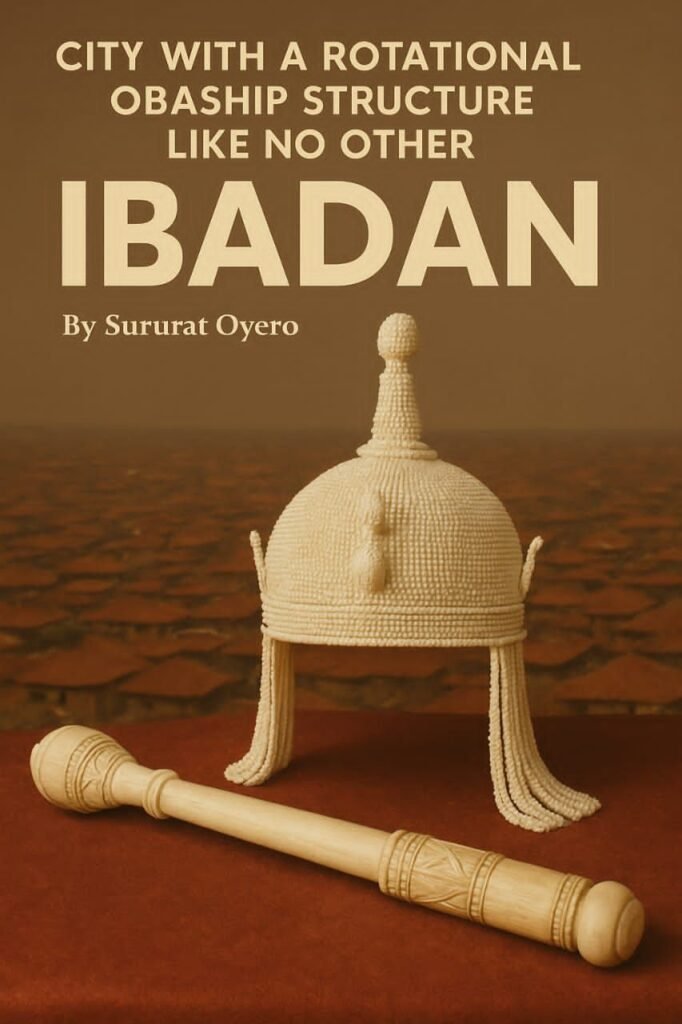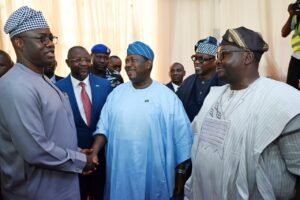CITY WITH A ROTATIONAL OBASHIP STRUCTURE LIKE NO OTHER, IBADAN
By Sururat Oyero

The ancient city of Ibadan, often called the political capital of the Yoruba race, is unique in many respects. Among its most outstanding features is the rotational Obaship system – a time-honoured institution that stands out tall as a shining example of stability, inclusivity, and order in traditional governance. It is a system that has preserved harmony in leadership for over two centuries and continues to serve as a model for others to study and emulate.
The Ibadan Obaship structure is a rare model of traditional meritocracy, standing out not only in Nigeria but across Africa. In many places, royalty is shrouded in privilege and exclusion, but in Ibadan, the path to the throne is predictable, peaceful, and earned.
A Merit-Based System of Succession like no other, where kingship is not tied to hereditary, royal families or ruling houses. The Olubadan of Ibadanland ascends the throne through a progressively structured chieftaincy hierarchy. This progression is based on seniority, experience, and service, rather than bloodline or lineage. Each titleholder advances over time, through the civil line (Egbe Agba) or through the the military line (Egbe Balogun) with the most senior eventually becoming Olubadan. This way, the eventual monarch is mature, well-experienced, deeply rooted in Ibadan culture, and familiar with public service.
The open and egalitarian spirit of Ibadan, is one where any committed “son of the soil” may rise through perseverance and contributions, to become king.
This unbroken chain of peaceful transitions since the time of Lagelu in 1820, has produced 43 monarchs, each reigning in peace and largely without the acrimony or chaos often associated with succession in traditional institutions. From the legendary Basorun Oluyole to Oba Samuel Odulana, and most recently Oba Akinloye Olalere Owolabi Olakulehin (2024–2025), Ibadan has consistently demonstrated that leadership can change hands without crisis.
Despite some monarchs ruling for as little as three months, such as Oba Igbintade Apete (1952) and Oba Yesufu Kobiowu (1964), the succession process remains orderly and respected. This is testament to the wisdom of Ibadan’s elders and strength of the system.
Ibadan’s monarchs have come from diverse backgrounds like war generals, intellectuals, civil servants, and business magnates, each bringing his own unique strengths to the throne:
Oba Isaac Babalola Akinyele (1955–1964), an Anglican clergyman and nationalist, brought dignity and influence to the traditional stool.
Oba Saliu Akanmu Adetunji (2016–2022), a renowned record label executive, was celebrated for his support of youth and culture.
Oba Samuel Odulana Odugade I (2007–2016), a respected civil servant and elder statesman, was admired for his wisdom and humility.
Ibadan has never been without a clearly identified successor. The most senior high chief is always next in line, with the city often knowing its future king many years in advance. This eliminates contention and ensures continuity.
This leadership structure, favoured by destiny and sustained by divine grace, has contributed to its stability, influence, and cultural prominence in Yorubaland and Nigeria at large.
It has demonstrated that tradition, when guided by wisdom and order, can be a force for unity, development, and pride.
As we remember the lives and legacies of the past 43 Olubadans, we are reminded that Ibadan is not just a city; it is an institution of heritage, culture, and enlightened leadership. It is a symbol of order in an age of disorder, a system that champions duty over dynasty, and service over status.
In a world where leadership is often contested and divisive, Ibadan stands as a beacon of how tradition can work, not against progress, but in partnership with it.
Long live Ibadanland.
Long live the throne of Olubadan.
Long live our cherished legacy.









